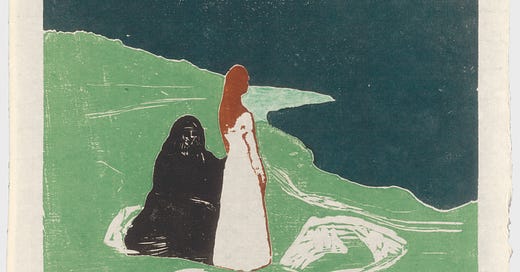It was time to turn the lights out. I was in bed — which is where I do a lot of my reading — but as I reached for my lamp I saw First Love: Essays on Friendship by
on my nightstand. I picked it up, intending to read the first page, and I read the first three essays.The rest of my time reading this book went similarly: fast and obsessive. Through 15 essays, Lilly Dancyger writes about her first loves aside from family: which is to say, her friends. She writes with such heart, such grit, that I ached when she ached; I felt loved when she felt loved.
The book opens with an essay about her cousin and dear friend, Sabina, who was murdered a few weeks before her twenty-first birthday. Lilly spent the summer after Sabina died sitting on her fire escape in NYC, smoking cigarettes and drinking whiskey and being visited by her friends, her other loves. Of her best friends that summer, Lilly says:
I saw so clearly their love for me, how lucky I was to have them, how much each of them meant to me.
She wrote this book years and years after Sabina was murdered. At first she thought it would be a murder memoir, but it is something else entirely.
I met Lilly at the AWP conference in February. I’d never heard of her, but I attended a panel she led, then ended up seated beside her (and a couple of her friends, naturally) in a basement bar where we watched a Battle of the Genres literary throwdown led by author Rebecca Makkai. I asked her about her teaching, about her forthcoming book (First Love had yet to be published), and other questions I might not have asked had I understood who she was. She was kind and she answered all my questions, but she was also busy. She had her friends, and now, after reading her book, I know what that means to her.
My naïveté made our interaction genuine. Six months after we met, while reading about her many friendships in First Love, I could see it all. I could see her walking her friends home at night so they wouldn’t have to go alone, then her walking back to her own place along the same dark streets. I could picture a teenaged Lilly in a city park, rolling cigarettes and making new friends. It’s not to say you need to have met Lilly to enjoy the book; it just added to my experience.
In Sad Girls, Lilly talks about her friend who died by suicide. I read through the essay in a state of surprise, admiring how candid she was about her relationship with this friend of hers who was struggling. She writes about Janis Joplin’s album Pearl and Sylvia Plath’s The Bell Jar, pontificating on whether those works would be so popular had the creators not died the way they had.
In Mutual Mothering, she writes about how the love in friendships can be a type of mothering. We take care of our friends in similar ways that we take care of our children. It’s an incredible essay. They all are.
If you want a taste, you can read It Comes in Waves on Longreads here or In Search of Smoky Cafés in Off Assignment here, both of which are excerpts from the book.
What I’m reading: I am finally reading Big Swiss by Jen Beagin! I also have the enormous honor and pleasure of reading
’s novel, whose title I won’t share. But let me tell you: you’ll want to read this book!What are you reading?
Love,
Words on Words is a free newsletter about books that hits inboxes on Thursdays. Subscription upgrades exist so readers can support my work if they feel compelled, but these weekly essays are free.
When you purchase books through my links, you support Words on Words (I get credits for more books) and an indie bookstore of your choice at no additional cost to you.









Thanks for highlighting Lilly's essays. Big Swiss was great! I'm slowly reading The wild iris.
Years ago I submitted an essay to Lilly after she posted a call on Twitter and she emailed the kindest, most encouraging rejection. I’ve followed her ever since. I loved this book!